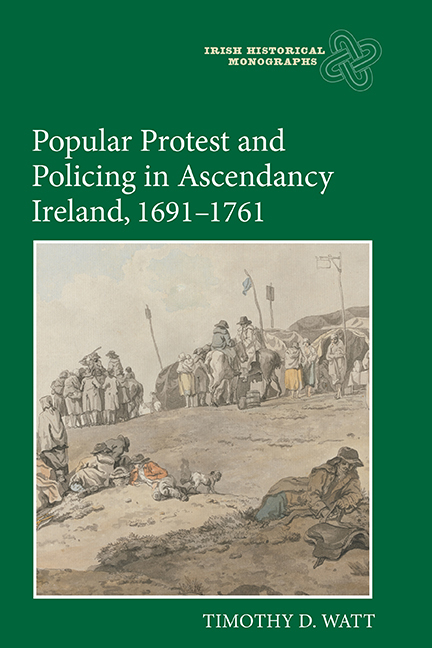Book contents
- Frontmatter
- Dedication
- Contents
- List of illustrations
- Acknowledgements
- Principal abbreviations
- Notes on conventions
- Glossary
- Introduction
- Part One Policing and large-scale disorder
- 1 Civil Law Enforcers in a ‘Self-policing’ Society
- 2 The Standing Army and Policing
- 3 Local Militias, Irregular Forces and the ‘Tory Wars’
- Part Two Popular Protest and Collective Action
- Appendix: Irish Combination Acts, 1705–80
- Bibliography
- Index
- Irish Historical Monographs previous volumes
3 - Local Militias, Irregular Forces and the ‘Tory Wars’
from Part One - Policing and large-scale disorder
Published online by Cambridge University Press: 12 October 2019
- Frontmatter
- Dedication
- Contents
- List of illustrations
- Acknowledgements
- Principal abbreviations
- Notes on conventions
- Glossary
- Introduction
- Part One Policing and large-scale disorder
- 1 Civil Law Enforcers in a ‘Self-policing’ Society
- 2 The Standing Army and Policing
- 3 Local Militias, Irregular Forces and the ‘Tory Wars’
- Part Two Popular Protest and Collective Action
- Appendix: Irish Combination Acts, 1705–80
- Bibliography
- Index
- Irish Historical Monographs previous volumes
Summary
The first organised national militia force, comprised of ‘citizen soldiers’, was formed by Lord Lieutenant James Butler, duke of Ormond, in 1666 in order to enhance the potency of the regular army and help counter internal or external threats. In the later seventeenth and early eighteenth centuries the militia was haphazardly controlled and, unlike the regular army, appeared to have very little central control. However, after the Jacobite revolt in Scotland in 1715 the Irish parliament introduced regulations to ‘make the militia of the kingdom more useful’ by establishing it as a military reserve. The militia act of 1716 required all Protestant males between sixteen and sixty years of age to serve, and fines were imposed on anyone who refused. Catholics were prevented from joining the force but still obliged to provide the militia with funds (double the amount Protestants had to give), and supply horses to militiamen at times of emergency. The act also barred Dissenters from joining, despite claims from some supporters that Presbyterians had shown ‘zeal and steadiness’ in the face of previous threatened invasions and revolts.
The militia was especially important to Protestants since many in the middling and lower social orders were discouraged from joining the regular army by the British government, who were worried that the unrestricted recruitment of Protestants into the army would significantly reduce their number in Ireland. Exceptions to this rule were the sons of established ‘military’ families in Ireland, who were well represented as cavalry officers. Consequently, at least some of the men who joined the militia did so willingly, as it was an opportunity for Irish Protestants to take up arms in peacetime as part of an organised military force.
Militias had a distinctive local character and, as such, helped to cement together the social relations between Protestant landowners and the Protestant men working on their lands. Gentlemen raised regiments from their tenants and farmers, employed adjutants to recruit men from the major towns, issued commissions to friends and relations, and paid for some of the financial costs. Unsurprisingly, perhaps, Protestant interest in the militia was at its highest when there were ‘national’ emergencies. During the invasion scare of 1708, for example, it was reported from County Clare to Lord Inchiquin that eight troops of militiamen under the command of their captains had served the queen with ‘zeal and ambition’.
- Type
- Chapter
- Information
- Publisher: Boydell & BrewerPrint publication year: 2018

